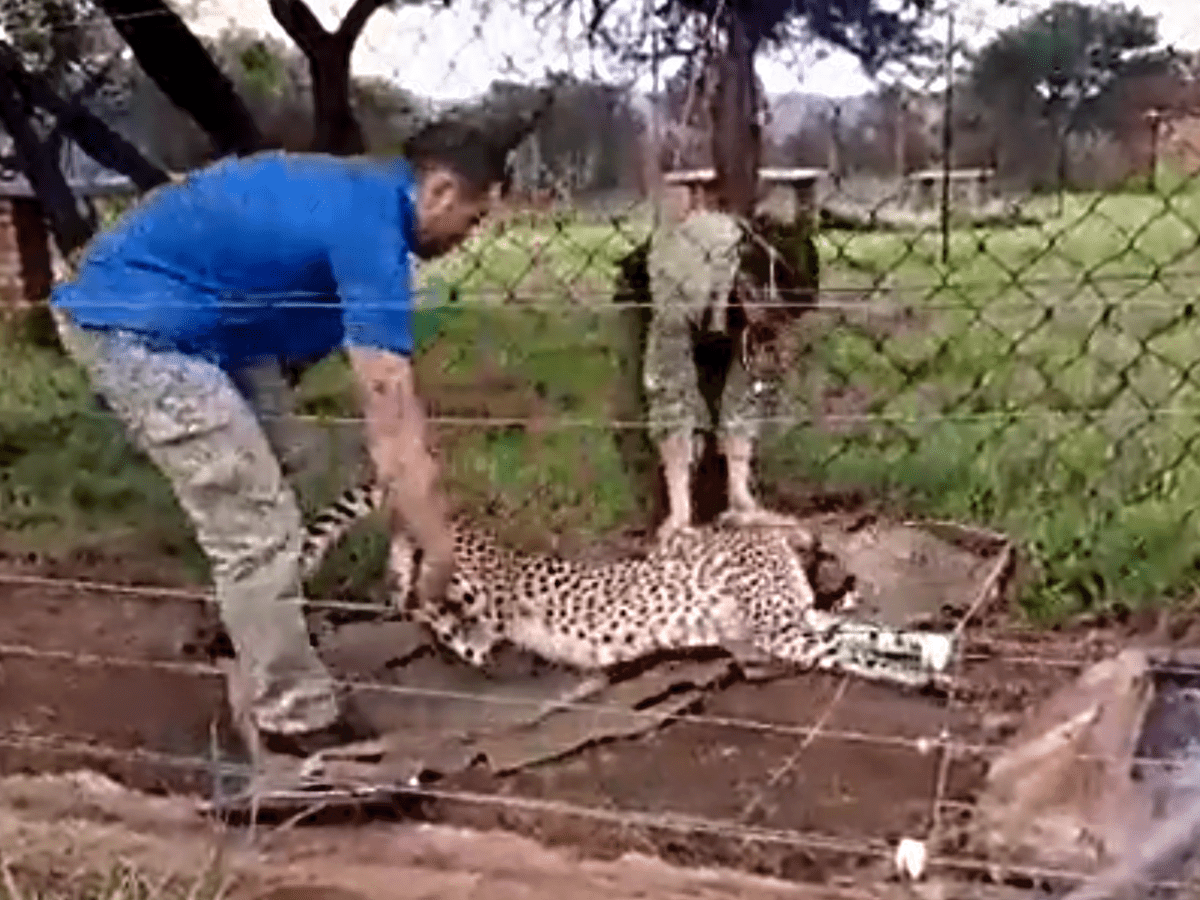
Gwalior: An Indian Air Force (IAF) plane carrying 12 cheetahs from South Africa landed in Madhya Pradesh’s Gwalior on Saturday morning, from where they will be taken to the Kuno National Park (KNP) in Sheopur district, around 165 kms from here, and released into quarantine enclosures.
These cheetahs – seven males and five females – comprise the second set of big cats coming to the state, with the first group of eight from Namibia having been released into the KNP on September 17 last year at a function by Prime Minister Narendra Modi.
“A plane carrying cheetahs from South Africa landed at the Gwalior airport around 10 am,” Gwalior Superintendent of Police (SP) Amit Sanghi told PTI.
After the clearance procedure in Gwalior, these cheetahs will be flown to the KNP in an IAF helicopter, another official said.
As per the plan, they will be offloaded at the KNP around 12 noon, after which MP Chief Minister Shivraj Singh Chouhan and Union Minister for Environment and Forests Bhupender Yadav would release them into quarantine bomas, he added.
These animals had embarked on a journey to their new home thousands of miles away aboard an IAF transport aircraft from the O R Tambo International Airport, Gauteng in South Africa shortly before midnight, a project participant and expert told PTI.
KNP Director Uttam Sharma said they have set up 10 quarantine bomas for South African cheetahs. In two of these facilities, two pairs of cheetahs would be kept.
“We have completed our preparations to receive the big cats,” he added.
The intercontinental translocation of these fastest land animals – first from Namibia and now from South Africa – is part of the
Indian government’s ambitious cheetah reintroduction programme. The country’s last cheetah died in Koriya district of present-day Chhattisgarh in 1947 and the species was declared extinct in 1952.
Experts said a delegation from South Africa had visited the KNP early September last year to see the arrangements at the wildlife sanctuary for housing the cheetahs.
A Memorandum of Understanding (MoU) was signed between India and South Africa last month for the translocation of the mammals.
South Africa has donated these big cats to India. But India has to pay USD 3,000 for the capture of every cheetah to the African nation before they are translocated, said the wildlife expert.
India had planned to airlift these South African cheetahs in August last year but couldn’t do so due to delay in signing a formal translocation agreement between the two countries.
PM Modi had released eight cheetahs flown in from Namibia into the KNP on September 17 last year amid a lot of fanfare, setting the ball rolling for the revival of their population in India where these distinctively spotted cat species became extinct seven decades ago.
The cheetahs from Namibia five females and three males are currently in hunting enclosures at the park before their full release into the wild.
Due to the delay in the MoU signing for the inter-continental translocation of these big cats, some experts had in December expressed concern over the health of the South African cheetahs as these animals have been quarantined in their home country since July 15 in anticipation of their transfer to India.
As per Indian wildlife laws, a month-long quarantine is mandatory before importing animals and they are required to be kept in isolation for another 30 days after arrival in the country.
The experts said the spotted animals’ metapopulation (cheetah count in small and medium parks) in South Africa has risen to 504 from 217 in 2011.
Former Union Environment Minister Jairam Ramesh had initiated ‘Project Cheetah’ in 2009 under the United Progressive Alliance (UPA) government with an aim to reintroduce the wild cats in India.



